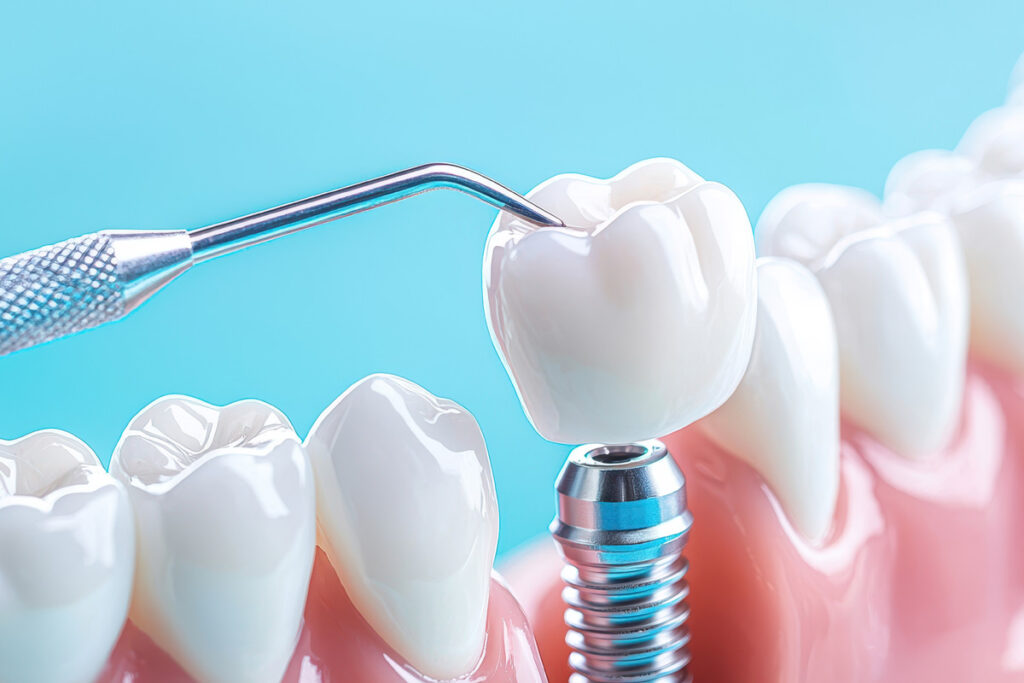You’ve taken the leap and invested in dental implants that allow you to bite into your favorite foods without worry and flash your best smile in photos. Your new dental implants offer a remarkable solution that provides both aesthetic appeal and functionality that can last for decades. But how can you increase the lifetime of your dental implants to enjoy the benefits for as long as possible? With quality care and support, your dental implant investment can last a lifetime, giving you confidence in your smile and ability to eat comfortably for years to come.
At Newport Beach Dental Center, Dr. Laura Sharbash, DDS, FAGD, D.ABDSM, is committed to helping patients maximize their investment in dental implants. Our biomimetic approach focuses on preserving natural tooth structure and ensuring restorations that work harmoniously with your oral health. Here are seven proven strategies to extend the life of your dental implant.
1. Practice Excellent Oral Hygiene
Maintaining high-quality oral hygiene is crucial for implant longevity. According to a study in the Journal of Oral Medicine and Oral Surgery, dental implants have a high success rate of 97% after 10 years and 75% after 20 years with proper oral care. Unlike natural teeth, implants don’t develop cavities but remain susceptible to plaque buildup’s harmful effects. Because of this, your daily care routine should include:
- Brushing at least twice daily with a soft-bristled toothbrush
- Flossing around the implant with a floss threader
- Using an antimicrobial mouth rinse to reduce bacteria
- Cleaning with interdental brushes to reach difficult areas around the implant
Remember that the tissue surrounding your implant requires special attention to stay healthy. We recommend gently cleaning along the gumline as part of your routine to prevent inflammation and infection, which can ultimately result in implant failure.
2. Schedule Regular Dental Checkups
Professional monitoring plays a vital role in extending the life of your implant. During these exams, your dentist can detect early warning signs of potential issues before they become serious problems.
At your dental checkups, we will examine the implant for stability, evaluate the surrounding gum tissue, and take periodic X-rays to check bone levels around the implant. Professional cleanings are also recommended to remove hardened plaque (tartar) that home care might miss. We suggest that most patients visit every six months, though your dentist may recommend more frequent appointments based on your specific needs.
3. Avoid Harmful Habits
Certain habits can place excessive stress on your implant, potentially leading to complications or failure. Eliminating these behaviors can significantly improve implant longevity.
Smoking is particularly damaging as it restricts blood flow to the gums, impairs healing, and increases infection risk. Other habits to avoid include using your teeth as tools (opening packages, biting fingernails), grinding or clenching your teeth, and chewing extremely hard foods like ice or hard candy.
4. Wear Night Guards When Recommended
If you grind or clench your teeth at night (bruxism), the excessive force can damage both natural teeth and implants. This condition affects many adults and can place immense pressure on dental work.
A custom-fitted night guard creates a protective barrier between your upper and lower teeth, distributing pressure evenly and preventing damage to your implant restoration. While over-the-counter options exist, a professionally made night guard offers superior protection and comfort.
5. Maintain Quality Overall Health
Your general health can significantly impact the success of your dental implant. Certain medical conditions can affect bone health and the healing capacity around implants.
Conditions requiring extra vigilance include:
- Diabetes
- Osteoporosis
- Cancer treatments
- Autoimmune disorders
Managing these conditions through proper medical care, medication, diet, and lifestyle choices helps maintain the strong bone and healthy tissue needed to support your dental implants. It is crucial you always inform your dentist about any health changes or new medications during your routine exams to ensure you are receiving the best treatment possible for your situation.
6. Choose Foods Wisely
While dental implants restore near-natural biting force, they can still benefit from mindful food choices. A well-balanced diet full of calcium, vitamin D, and protein supports bone health and, in return, your implant.
Be cautious while eating extremely hard foods, as they could damage the crown portion of your implant. Similarly, very sticky foods might dislodge crowns if they aren’t fully secured. Cutting harder foods into smaller pieces and chewing with teeth on both sides of your mouth can distribute pressure more evenly and protect the long-term health of your dental implant.
7. Respond Quickly to Problems
If you notice any unusual symptoms around your implant, seeking immediate professional care can prevent minor issues from becoming major problems. Some warning signs that require attention may include:
- Bleeding or swollen gums around the implant
- Discomfort or pain when chewing
- Visible recession of the gum line
- Loosening of the implant crown
- Persistent bad breath or unusual taste
Early intervention for conditions like peri-implantitis (inflammation around an implant) can sometimes mean the difference between saving and losing your implant. If you experience any of these symptoms, please contact us at Newport Beach Dental for an urgent appointment to ensure your implant has the best chance of survival.
Trust Your Dental Implant Care to Newport Beach Dental Center
Dental implants are a considerable investment in oral health and quality of life. At Newport Beach Dental Center, Dr. Laura Sharbash combines advanced training with a commitment to personalized care for each patient. As a Fellow of the Academy of General Dentistry (FAGD) and a Diplomate of the American Board of Dental Sleep Medicine (D.ABDSM), Dr. Sharbash brings exceptional expertise to implant dentistry.
We partner with you to ensure the longevity of your implant through comprehensive care and maintenance. For more information about dental implants or to schedule your next checkup, call us at (949) 760-9212 or fill out our contact form.


